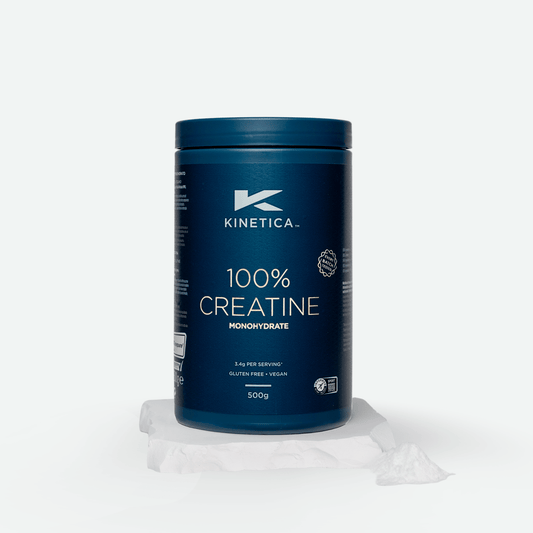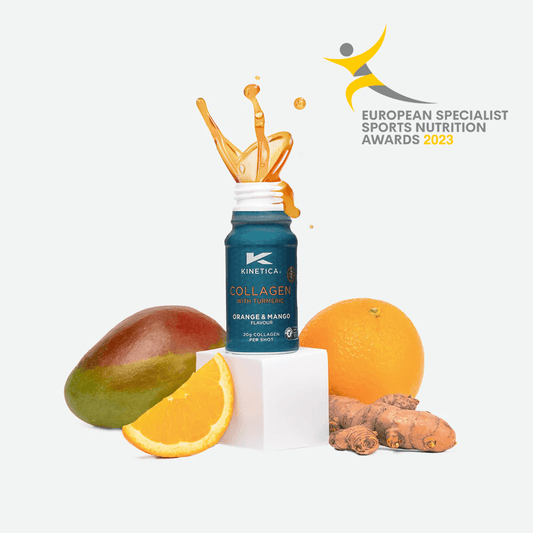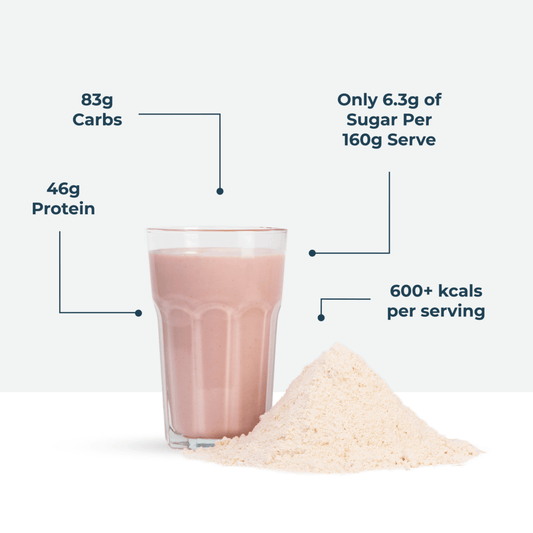What it is Creatine and who should use it?

What is creatine?
Why is creatine important?
What are the benefits of creatine?
Does Creatine Increase Muscle Mass?
Does Creatine Enhance Recovery after Exercise?
Is Creatine Beneficial for High Intensity Exercise?
What are the different types of creatine?
How should I take Creatine?
When should I be taking Creatine?
How to take Creatine Monohydrate?
Who should use Creatine?
Can vegetarians use Creatine?
Summary
Creatine supplementation has risen in popularity within the exercise community over recent years, but what is it, and how can it benefit your training? In this article, we’ll explore how adding creatine to your diet can help you reach your goals.
What is Creatine?
Creatine is one of the most researched natural products in literature and one of the most popular supplements among athletes and exercising individuals. But what is it?
Without doing a deep dive into the science, creatine is a naturally occurring compound which is made from the amino acids L-arginine, glycine, and L-methionine. Approximately 95% of creatine within the body can be found in muscle tissue, with the remaining 5% found in the brain, kidneys, liver, and testes. For a 70kg male, around 120g of creatine is stored in the body, with women having 70-80% lower levels of creatine than males1.
People who eat foods such as red meat and fish, both of which contain creatine, ingest about 2g of creatine per day. As an example, there is approximately 1-2g of creatine in 450g of beef.
Why is creatine important?
For our muscles to contract and move we need energy. This energy is provided by a molecule in the body known as Adenosine Triphosphate or ATP. ATP is often called the ‘energy currency’ within the body, as it provides energy to your cells2. However, we only have about 40g of ATP stored within our muscles, which provides energy for about 2-4 seconds of high intensity running.
When we need to generate energy fast, such as during high intensity exercises like sprinting, we predominantly use the phosphocreatine energy system. Phosphocreatine is a very high energy source that can produce a large amount of energy quickly, but this can only last between 1-10 seconds. As there is approximately only 120g of phosphocreatine available in the body, a depletion of this can be a contributing factor to the fatigue you feel during high intensity sprints.
Creatine supplementation can increase levels of phosphocreatine, which is then used to rapidly regenerate ATP. As a result, more ATP means that repeated bouts of high intensity can be maintained.
What are the benefits of creatine?
There are multiple benefits of creatine supplementation, some of which include:
- Increased muscle mass.
- Enhanced recovery.
- Provide energy for high-intensity exercise.
- Injury prevention and rehabilitation.
We will explain more about these benefits throughout this article, to help you understand just what creatine can do to help you reach your goals.

Does creatine increase muscle mass?
Creatine plays an important role in increasing muscle mass, but it doesn’t work in isolation. Consuming creatine alongside resistance exercise is key to maximising strength gains and increasing muscle mass.
Studies have shown increases in 1RM for strength and power when supplementing with creatine. In fact, in one study there was an average increase in 1RM of 8.2kg3. Increases in strength can be as much as 28% depending on the strength training programme.
Conclusion: Creatine supplementation alongside resistance exercise can increase muscle mass, maximal strength and lifting volume, with significant increases observed for bench presses, squats, and power clean lifts in particular.
Does creatine enhance recovery after exercise?
Consuming creatine can also support the recovery process. Taking it alongside a carbohydrate and protein source may help improve recovery following exercise and reduce muscle damage.
It can also be beneficial for reducing Delayed Onset Muscle Soreness, or DOMS. Endurance athletes can also benefit from creatine to improve recovery. Several studies have shown that creatine loading reduces muscle damage, and can reduce the levels of inflammation in cells.4, 5
Conclusion: Creatine supplementation can aid with recovery following intense exercise, and therefore is beneficial for strength athletes and endurance enthusiasts by reducing DOMS as well as reducing inflammation after endurance events.
Is creatine beneficial for high intensity exercise?
Yes, 100%. Evidence has shown that creatine can be beneficial to support high intensity exercise such as sprints or explosive lifts.
As we mentioned above, when we need to generate energy fast, we predominantly use the phosphocreatine energy system. This is then used to rapidly regenerate ATP which allows our muscles to contract and move. Creatine supplementation can increase levels of phosphocreatine, which means that repeated bouts of high intensity exercise can be maintained.
Conclusion: Creatine can provide energy for ATP which is important for high intensity training. Therefore, consuming creatine will help with those repeated bouts of sprinting and explosive lifts, which increase total work or volume in a single training session.
What are the different types of creatine?
There are several variations of creatine on the market. These include but are not limited to: creatine monohydrate, which is the most popular and most researched creatine in literature; creatine salts; Kre-alkalyn creatine and creatine ethyl ester. However, there are no studies to show that these are more effective or superior to creatine monohydrate.
Creatine Monohydrate
Creatine monohydrate is the most effective form of creatine. Creapure® leads the way for creatine processing, being 99.9% pure creatine monohydrate, and is therefore considered the gold standard. Supplementing with creatine monohydrate can increase power and strength, improve sprint performance, and help with recovery after exercise6.
Kre-alkalyn Creatine
Kre-alkalyn creatine is a PH balanced form of creatine. However, supplementing with Kre-alkalyn creatine by loading or maintenance did not increase muscle creatine stores or improve strength7.
Creatine Ethyl Ester
This form of creatine is said to increase creatine bioavailability. However, supplementing with creatine ethyl ester did show any additional benefit to improving strength and performance8.
How to take creatine monohydrate
To ensure that you get the most from your creatine supplement, you need to know how to take it for the best results. Below we’ve outlined the various protocols you can use to supplement your training with creatine monohydrate.
Creatine Loading Phase
The purpose of creatine loading is to saturate your muscles with creatine within a short time frame and is the most effective way to increase muscle creatine stores. This process involves ingesting 20g, or 0.3g per kg of bodyweight, of creatine four times a day for 5-7 days.
However, the loading phase is not always required. Muscle creatine stores can be increased by consuming a lower dose over a longer period of time. Ingestion of 3g of creatine over a 4-week period can increase creatine levels to that of the loading phase. But, this will take longer and as a result you may not get the full performance benefit compared to participating in the loading phase.
Creatine Maintenance Phase
Once your muscular creatine stores have been saturated via the loading phase, it is possible to lower your daily intake so that you consume 3-5g of creatine as part of a maintenance dose. Be aware that larger athletes may need to consume 5-10g in order to maintain muscle saturation9.

When should you take creatine?
Creatine can be consumed at any time of the day, not just for before or after exercise. As a dietary supplement, you should take creatine even on the rest days (especially during the loading phase) and definitely after intense exercise to help with recovery.
Interestingly, a 2013 study, which involved separate groups consuming creatine either before or after resistance exercise over a 4-week period, concluded that creatine was best consumed post exercise, with the individuals that consumed creatine post exercise increasing their muscle mass by an average of 1.8kg10.
How should you take creatine?
You can consume creatine with water, but to get more bang for your buck, try mixing 1-2 scoops of creatine with a carbohydrate or carbohydrate and protein shake to maximise creatine uptake into the muscles.
For more inspiration on how to include creatine monohydrate into your diet, why not explore some of our favourite Recipes?
Who should use creatine?
Creatine can be beneficial for anyone involved in sports such as GAA, football, rugby, cycling, athletics, rowing, or tennis. Having sufficient creatine muscle stores means that you will be able to do repeated sprinting, something which is important for most sports.
However, creatine is not just a supplement for sports individuals. There are also benefits of creatine supplementation as we age.
Sarcopenia is defined as a loss of skeletal muscle and function which leads to a decrease in muscle strength and performance. To reduce the impact of sarcopenia, a combination of creatine supplementation, increased protein intake and strength training can be beneficial, with positive evidence to show this can mitigate these losses in muscle function11.
Other studies show the positive correlation between creatine supplementation on reduced mental fatigue and improved cognitive function in elderly individuals12.
Can vegetarians take creatine?
Yes, they can. Unlike dietary sources, creatine supplements use chemical synthesis to manufacture creatine. This means that no animal products are used during production.
In fact, as vegetarians don’t consume meat and fish (foods that naturally contain creatine), they may benefit more from creatine supplementation to significantly increase their muscle creatine stores13. It has been reported that vegetarians have lower levels of creatine stores compared to an individual who would consume a diet containing red meat and fish.
At Kinetica Sports, our 100% Creatine Monohydrate is made using Creapure®, which ensures it is vegan-friendly.
In summary
Overall, creatine can be incredibly beneficial for everyone, from weekend warriors to professional athletes, and even older people may see some benefits to regularly ingesting creatine to help mitigate the effects of ageing.
Choose Kinetica Sports for your creatine supplements
From pre-workout, to recovery, at Kinetica Sports, we have a wide range of dietary supplements for you to choose from to help you reach your goals.
We understand how important having access to top-quality supplements is to achieving your goals, which is why all of our products are held to rigorous testing standards in line with Informed Sport and WADA (World Anti-Doping Agency) regulations.
Read More: Does Creatine Create Weight Gain and Increased Muscle Mass?
References
1. Smith-Ryan, A.E., et al, 2021, ‘Creatine Supplementation in Women’s Health: A Lifespan Perspective’, in Nutrients, 13(3):877. Available from: https://www.ncbi.nlm.nih.gov/pmc/articles/PMC7998865/
2. Dunn, J., & Grider, MH., 2023, ‘Physiology, Adenosine Triphosphate’, in StatPearls [Internet]. Available from: https://www.ncbi.nlm.nih.gov/books/NBK553175/
3. Miller, D.R., 2017, ‘Six Weeks of Creatine-Electrolyte Supplement Effects of Muscle Fatigability’, in WWU Graduate School Collection, 596. Available from: https://cedar.wwu.edu/wwuet/596/
4. Jiaming, Y., & Rahimi, M.H., 2021, ‘Creatine supplementation effect on recovery following exercise-induced muscle damage: A systematic review and meta-analysis of randomized controlled trials’, in Journal of Food Biochemistry, 45(10):e13916. Available from: https://pubmed.ncbi.nlm.nih.gov/34472118/
5. Cordingly, D.M., Cornish, S.M., & Candow, D.G., 2022, ‘Anti-Inflammatory and Anti-Catabolic Effects of Creatine Supplementation: A Brief Review’, in Nutrients, 14(3):544. Available from: https://pubmed.ncbi.nlm.nih.gov/35276903/
6. Hall, M., Manetta, E., & Tupper, K., 2021, ‘Creatine Supplementation: An Update’, in Current Sports Medicine Reports, 20(7):338-344. Available from: https://pubmed.ncbi.nlm.nih.gov/34234088/
7. Jagim, A.R., et al., 2012, ‘Kre-Alkalyn® supplementation does not promote greater changes in muscle creatine content, body composition, or training adaptations in comparison to creatine monohydrate’, in Journal of the International Society of Sports Nutrition, 9(1):11. Available from: https://www.ncbi.nlm.nih.gov/pmc/articles/PMC3500725/
8. Spillane, M., et al., 2009, ‘The effects of creatine ethyl ester supplementation combined with heavy resistance training on body composition, muscle performance, and serum and muscle creatine levels’, in Journal of the International Society of Sports Nutrition, 19(6):6. Available from: https://pubmed.ncbi.nlm.nih.gov/19228401/
9. Kreider, R.B., et al., 2017, ‘International Society of Sports Nutrition position stand: safety and efficacy of creatine supplementation in exercise, sport, and medicine’, in Journal of the International Society of Sports Nutrition, 14:18. Available from: https://www.ncbi.nlm.nih.gov/pmc/articles/PMC5469049/
10. Ciccone, V,. Cabrera, K., & Antonio, J., 2013, ‘The effects of pre versus post workout supplementation of creatine monohydrate on body composition and strength’, in J Int Soc Sports Nutr., 10(1):P1. Available from: https://www.ncbi.nlm.nih.gov/pmc/articles/PMC4042900/
11. Dolan, E., et al, 2019, ‘Muscular Atrophy and Sarcopenia in the Elderly: Is There a Role for Creatine Supplementation?’, in Biomolecules, 9(11):642. Available from: https://pubmed.ncbi.nlm.nih.gov/31652853/
12. Konstantinos, P., et al., 2023, ‘Effects of creatine supplementation on memory in healthy individuals: a systematic review and meta-analysis of randomized controlled trials’, in Nutrition Reviews, 81(4):416-427. Available from: https://pubmed.ncbi.nlm.nih.gov/35984306/
13. Kaviani, M., Shaw, K., & Chilibeck, P.D., 2020, ‘Benefits of Creatine Supplementation for Vegetarians Compared to Omnivorous Athletes: A Systematic Review’, in International Journal of Environmental Research and Public Health, 17(9):3041. Available from: https://pubmed.ncbi.nlm.nih.gov/32349356/











